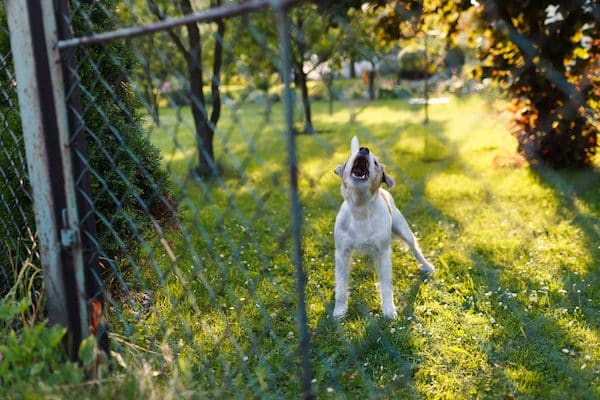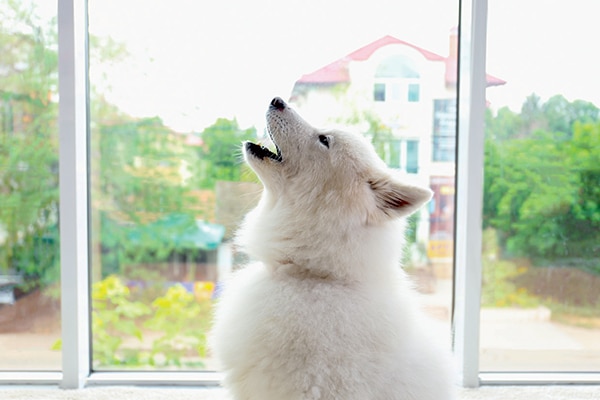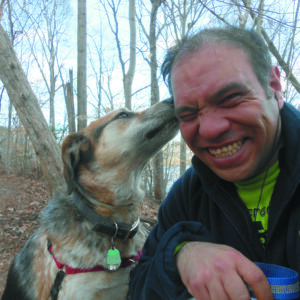In the forests and fields of untamed nature, howling is an important means of communication for dogs, as it was for their wolf ancestors before them. While modern domestic dogs have few of the anxieties that made howling necessary in the wild, the instincts remain as strong as ever. The vast majority of our four-legged companions don’t have to hunt prey or defend their families from predators, so why do dogs howl — still?

Dogs howl to find other dogs
Wild dogs and wolves live in packs, and members of these canine communities may have to wander far afield to find food. During these hunts, someone has to stay behind, whether to protect their dens, their young, or both. One practical reason wild dogs howl is to ensure that scouting parties can find their way back, like a vocal homing beacon. In more domestic settings, we are our dogs’ packs. When we’re out of the house for long stretches, our dogs howl, hoping we’ll hear their cries and head for home!
Dogs howl to raise an alarm
The very idea of a feral dog making monthly payments for a home security system is absurd when a fearsome vocal warning is free. Whether the entire pack is present or only a few remain to stand guard, a howling chorus alerts any strange dogs nearby that the territory is claimed. As you well know, your state-of-the-art video monitoring makes no difference to your dog. Even the most pampered pup is ready to raise the alarm at the scent of the mail carrier. Howling is just one way dogs try to protect their favorite humans.
Dogs howl to signal an interesting discovery
Some dogs howl instinctively when they make surprising discoveries. Hunting breeds, hounds especially, have a reputation for the volume and length of their vocalizations when they locate game. Of course, most dog owners don’t depend on their pets to retrieve dinner and can find late-night howling more annoying than triumphant. My own dog, Baby, is a Bluetick Coonhound mix and quite a howler in her own right. I’ve had to accept that, occasionally, she will not stop until I’ve personally congratulated her on the terrified squirrel or confused opossum she’s cornered.
Dogs howl because they have separation anxiety
Dogs are social creatures of habit; this can present problems for ones who live in single-dog households. If you fail to return at your regular time, howling is a typical outlet for dogs to express loneliness or separation anxiety. Short of getting another dog, we need to give the ones we have plenty of toys and distractions. These can keep dogs busy during the hours we’re not there to give them the ear scratches they’ve come to expect.
Dogs howl for attention
Dogs can use howls to show how well they’ve got us trained. It doesn’t take a dog long to learn that you pop your head in when he starts baying. Like me, perhaps you dash across the house to see what Baby has found this time, only to see her roll over, waiting for a belly rub. Go through this routine enough times, and your dog, too, will learn that howling is an easy way to bring you running.
Maybe they just miss it!
The closest most of our dogs have ever been to an actual pack was huddling among their littermates as puppies. Why, then, would dogs who live in cities howl at the sound of approaching sirens? How do they know to do it when you start making howling noises yourself? Maybe, in these sounds, they hear the song of their people and feel the need to respond in kind!
Thumbnail: Photography by Africa Studio/Shutterstock.
Read more about dog sounds on Dogster.com:
- Is Your Dog Barking and Annoying Your Neighbors? Here’s What to Do
- Is Your Dog Snoring? Do All Dogs Snore?
- 4 Things You Should Know About Dog Growling
Melvin Peña is a writer, editor, social media manager and SEO specialist who spends most of his time in Durham, North Carolina. His interests include his dog, Baby (of course!), art, hiking, urban farming and karaoke.






